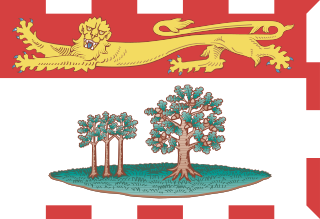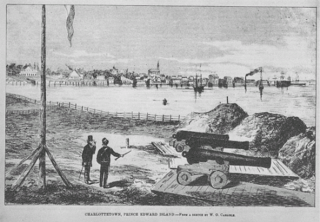George Wright (December 29, 1779 – March 13, 1842) was a businessman, judge and political figure in Prince Edward Island. He served as colonial administrator for the colony in 1825, in 1834, from 1835 to 1836, in 1837 and in 1841.

Prince Edward Island is a province of Canada consisting of the Atlantic island of the same name along with several much smaller islands nearby. PEI is one of the three Maritime Provinces. It is the smallest province of Canada in both land area and population, but it is the most densely populated. Part of the traditional lands of the Mi'kmaq, it became a British colony in the 1700s and was federated into Canada as a province in 1873. Its capital is Charlottetown. According to the 2016 census, the province of PEI has 142,907 residents.
He was born in Charlottetown, the son of Susanna Turner and Thomas Wright, who became in 1773 the first surveyor general of St. John's Island. Wright worked for his father for several years as deputy surveyor. On December 28, 1807 he married Phebe Cambridge, the daughter of merchant John Cambridge. In the following year, he went into business with his father-in-law and a brother-in-law. From 1810 to 1811, he served as high sheriff. In 1813, when the partnership dissolved, he became owner of a brewery and mills near Charlottetown. Wright served in the militia during the War of 1812, reaching the rank of lieutenant-colonel. He was named to the province's Council in 1813. In 1828, he was named assistant judge in the province's Supreme Court and also became surveyor general. Wright helped establish the Central Agricultural Society and served as its president. He died in Charlottetown at the age of 62.

Charlottetown is the capital and largest city of the Canadian province of Prince Edward Island, and the county seat of Queens County. Named after Charlotte of Mecklenburg-Strelitz, queen consort of King George III of the United Kingdom, Charlottetown was originally an unincorporated town that incorporated as a city in 1855.

The War of 1812 was a conflict fought between the United States, the United Kingdom, and their respective allies from June 1812 to February 1815. Historians in Britain often see it as a minor theater of the Napoleonic Wars; in the United States and Canada, it is seen as a war in its own right.
His son George also served as surveyor general for Prince Edward Island.









